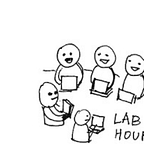by Mar Mcmahon
Recreating John Whitney
Zach introduced us to the works of early computer animation pioneer John Whitney. Recreating the work of John Whitney (and his analogue-leaning brother James) required us to introduce sine and cosine functions to our OpenFrameworks repertoire. We also explored sine and cosine’s relationship to the production of sound.
We learned about the analogue film roots of computed abstract graphics. We take for granted that most computational processes were at some point populated by physical elements. One of the most challenging exercises for many of us was trying to clear our minds of any goofy screensaver connotations and view Whitney’s work with the fresh eyes and wonder that it was met with at the time of its production.
We also found it funny to try and recreate the “flaws” of early computer animation within the precise environment of openFrameworks. Ariel found an openFrameworks add-on called ofxBlur that convincingly blurs openFrameworks graphics into having a more “1970s” feel.
Silicon Valley: 500 Years of Environmental Racism
In our Critical Theory class, we read the first chapter of Silicon Valley of Dreams by David Naguib Pellow and Lisa Sun-Hee Park. The chapter reveals how the environmental racism of today’s Silicon Valley is just the latest iteration of a centuries-long process of violent European colonization. All the way back to the original colonialism of the Spanish, European colonizers have racialized the division of labor and enforced a violent racial hierarchy in service of their exploitation of the area’s natural landscape.
Hardware
We all showed off our first circuitry projects, which ranged from a copper-thread circuit on canvas to a rudimentary decision tree to a tiny house that glows when two people squeeze it. This next week we’ll be building circuits that I, personally, find very challenging: logic gates.
Movement Workshop with Kai Kleinbard
On Friday, Kai Kleinbard of Movement Research led a movement workshop at SFPC. Kai worked with us to establish a foundation for movement, building up from the breath to the legs to the upper body. The workshop has sparked a new interest in house music among our cohort!
A Visit from Everest Pipkin
Internet curator and multidisciplinary artist Everest Pipkin came in on Friday to talk about their curatorial practice. Everest’s video curation project Snowfall DESTROYS Three Cars comprises “aggressive moments of peak human detritus gathered most lovingly”. Projects like these protect one of the best parts of the internet—the “human detritus”—from being snuffed out by the increasingly homogenized recommendation channels that funnel users into consuming monetized content.
Taeyoon Choi’s Distributed Web of Care
This week, Taeyoon’s participatory lecture-performance Distributed Web of Care took place at the Whitney. The performance was choreographed by Choi and Jerron Herman, and accompanied by live audio from Tiri Kananuruk and stud1nt. It “explores how it feels to be a node programmed in centralized, decentralized, and distributed networks.”
As students, we had the unique opportunity of both participating in the dress rehearsal on Monday, as well as hearing about the behind-the-scenes details of Taeyoon’s work on the project during class on Friday. This was the first time many of us had been exposed to the ins and outs of budgeting and logistics for a large-scale project. Taeyoon’s honest assessment of the emotional experience of doing this kind of large-scale collaborative work was thought-provoking. Distributed Web of Care also prominently included ASL interpretation and audio description, which sparked reflection among the class about making our own work accessible.
